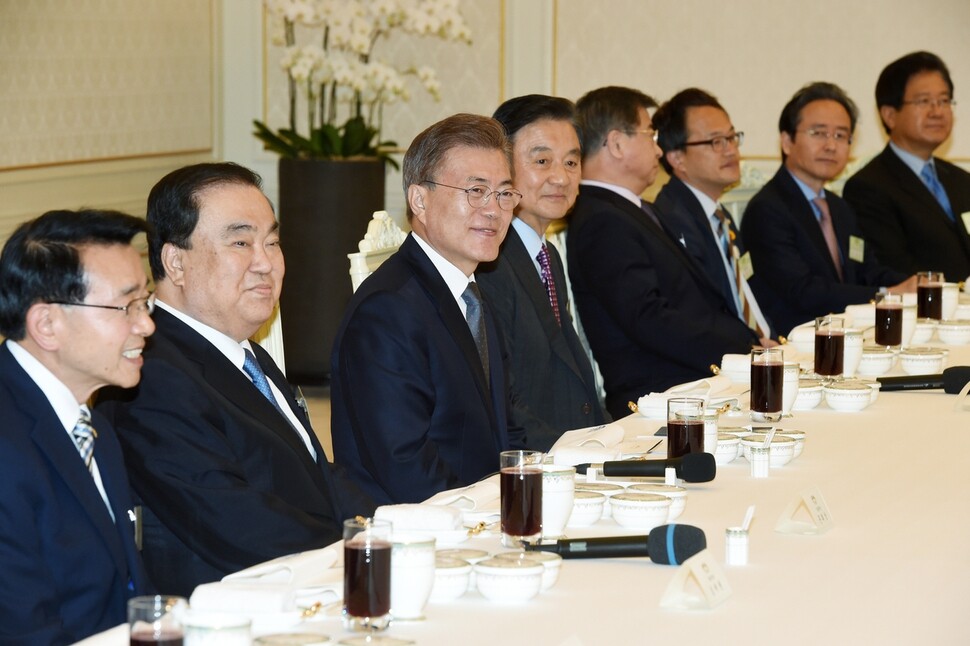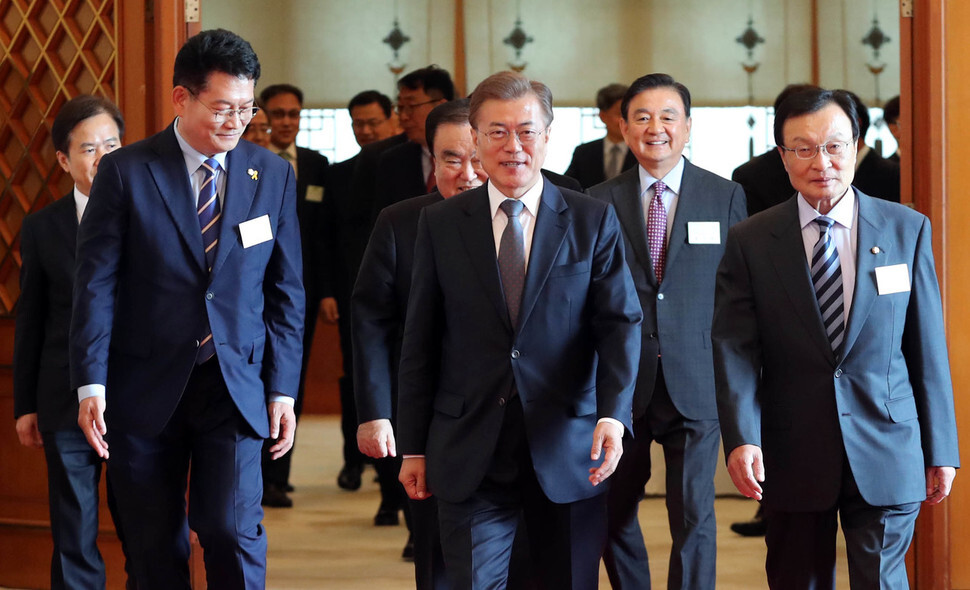hankyoreh
Links to other country sites 다른 나라 사이트 링크
Pres. Moon asks special envoys to stress administration’s origins in “people power”

President Moon Jae-in asked newly appointed special envoys to the US, China, Japan, Russia, and the European Union at a luncheon on May 16 to “stress that the new administration took office through ’people power‘ and that political legitimacy and transparency have now become very important.”
His remarks are being read as signaling his commitment to consulting public opinion and reopening discussions on controversial back-room deals made by predecessor Park Geun-hye’s administration on issues such as the Korean Peninsula THAAD deployment and the comfort women agreement with Japan.
Newly appointed special envoys at the luncheon included former JoongAng Ilbo and JTBC chairperson Hong Seok-hyun (US), Minjoo Party lawmaker Lee Hae-chan (China), former National Assembly Deputy Speaker Moon Hee-sang (Japan), Minjoo Party lawmaker Song Young-gil (Russia), and Sogang University Graduate School professor Cho Yoon-je (EU).
“The sending of special envoys marks the true beginning of summit diplomacy,” Moon declared at the luncheon.
“With the new administration, we have inherited a more serious diplomatic and security situation than ever before, as well as a summit diplomacy vacuum lasting more than six months,” Moon told the group.
“Our most urgent task is to fill that void,” he said.

South Korean summit diplomacy had been suspended from the period after the National Assembly voted to impeach Park in Dec. 2016 until just before Moon took office.
Moon explained that he had “called leaders in the US, China, Japan, Russia, and even the Canadian Prime Minister today to explain the direction of our foreign policy.”
“After our conversation, [US President Donald] Trump sent a team of senior envoys to hold an early South Korea-US summit, while China invited a South Korean delegation to its Belt and Road Summit,” he added to illustrate the resumption of summit diplomacy.
“[Chinese President] Xi Jinping also met personally with our delegation in China, while [Russian President Vladimir] Putin promised to meet with the special envoy we sent.”
Hong Seok-hyun said he would “share opinions on the North Korean nuclear and missile issue and issues related to the South Korea-US alliance with major US figures based on the conversation between the South Korean and US leaders.”
Lee Hae-chan noted that the Chinese ambassador to South Korea “expressed a wish to coordinate on a summit” during their meeting.
“I‘ve heard from China that they think the President [Moon] had a good conversation in his phone call with President Xi Jinping,” Lee continued, pledging to “work as an envoy so that that assessment remains.”
Moon Hee-sang said he had been inundated with phone calls since being named as a special enjoy, with many asking him to “give [Japan] a piece of our mind.”
“A lot of South Koreans seemed to expect a lot from me,” he said.
Offering a message of encouragement, Moon Jae-in said, “Throughout the election campaign I said the new administration’s foreign policy would be a customized cooperation approach focusing on national interests, and I see all of you who will be traveling as special envoys as the Republic of Korea’s top ‘tailor-made envoys.’”
Moon’s remarks drew particular attention with their references to political legitimacy and transparency, noting that the new administration “took office through people power.” They were read as sending the message that because the Moon administration’s election was the result of a “candlelight revolution” by the greater public, major diplomatic issues should be re-discussed in a way the public can support. The THAAD deployment issue has been a subject of controversy, with many contending the deal was not in South Korea’s interest - particularly after Trump recently insisted that South Korea bear US$1 billion in costs for its operation.
Since his candidacy, Moon has announced that he would submit the THAAD deployment process for National Assembly ratification and other scrutiny, citing issues with democratic procedure and legitimacy. The comfort women agreement similarly ran into public resistance after the Park administration unilaterally reached an agreement to receive 1 billion yen (US$8.8 million) and no apology from Japan, while ignoring the views of the survivors themselves. The claims that the administration undermined its own interests in the deal have only grown amid Tokyo’s demands to have comfort women statues taken down, which started soon after the agreement was reached. Moon hinted at a renegotiation of the comfort women agreement in a May 11 conversation with Japanese Prime Minister Shinzo Abe, noting that a majority of South Koreans “do not emotionally accept” it.
“The process of carrying out important national duties, be it on THAAD or other issues, needs to shared in a transparent matter, and the public’s intentions must be reflected in it,” said Blue House Senior Secretary to the President for Public Relations Yoon Young-chan.
By Choi Hye-jung, staff reporter
Please direct questions or comments to [english@hani.co.kr]

Editorial・opinion
![[Editorial] Does Yoon think the Korean public is wrong? [Editorial] Does Yoon think the Korean public is wrong?](https://flexible.img.hani.co.kr/flexible/normal/500/300/imgdb/original/2024/0417/8517133419684774.jpg) [Editorial] Does Yoon think the Korean public is wrong?
[Editorial] Does Yoon think the Korean public is wrong?![[Editorial] As it bolsters its alliance with US, Japan must be accountable for past [Editorial] As it bolsters its alliance with US, Japan must be accountable for past](https://flexible.img.hani.co.kr/flexible/normal/500/300/imgdb/original/2024/0417/6817133413968321.jpg) [Editorial] As it bolsters its alliance with US, Japan must be accountable for past
[Editorial] As it bolsters its alliance with US, Japan must be accountable for past- [Guest essay] Amending the Constitution is Yoon’s key to leaving office in public’s good graces
- [Editorial] 10 years on, lessons of Sewol tragedy must never be forgotten
- [Column] A death blow to Korea’s prosecutor politics
- [Correspondent’s column] The US and the end of Japanese pacifism
- [Guest essay] How Korea turned its trainee doctors into monsters
- [Guest essay] As someone who helped forge Seoul-Moscow ties, their status today troubles me
- [Editorial] Koreans sent a loud and clear message to Yoon
- [Column] In Korea’s midterm elections, it’s time for accountability
Most viewed articles
- 1‘Right direction’: After judgment day from voters, Yoon shrugs off calls for change
- 2[Editorial] Does Yoon think the Korean public is wrong?
- 3Where Sewol sank 10 years ago, a sea of tears as parents mourn lost children
- 4Samsung barricades office as unionized workers strike for better conditions
- 5[Column] The clock is ticking for Korea’s first lady
- 6Strong dollar isn’t all that’s pushing won exchange rate into to 1,400 range
- 7Korea, Japan jointly vow response to FX volatility as currencies tumble
- 8Faith in the power of memory: Why these teens carry yellow ribbons for Sewol
- 9Japan officially says compensation of Korean forced laborers isn’t its responsibility
- 10[Guest essay] Amending the Constitution is Yoon’s key to leaving office in public’s good graces